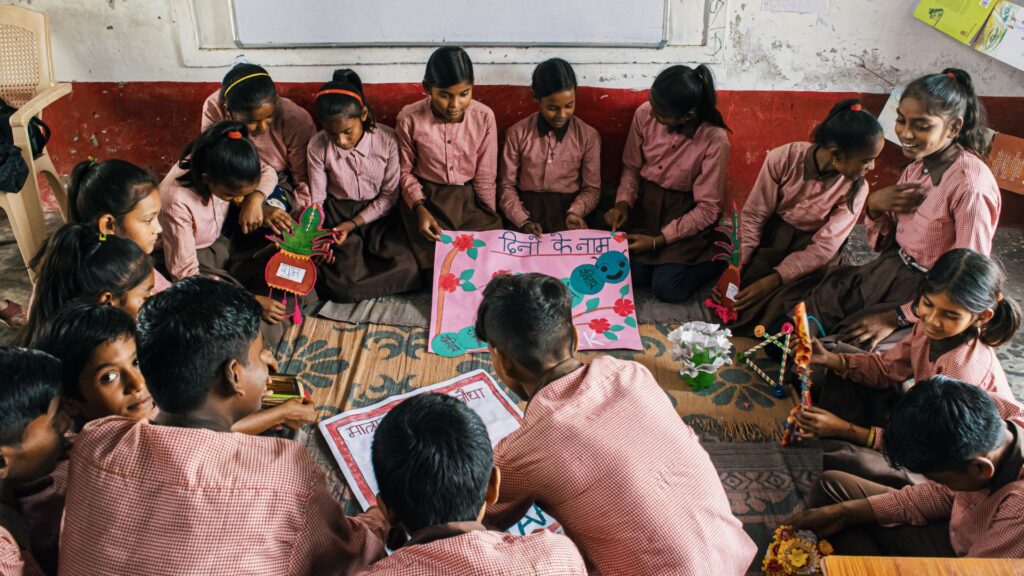Education and ECCED
Education is a powerful catalyst for societal development. It not only becomes a tool of individual development, but also to engage with the environment around in a more informed way.

Education in India has been a long journey, overcoming many hurdles. While urban areas show more progress in education achievements, rural areas seem to be lagging behind. Many focused attempts have been made especially for the rural areas to improve education status. The public education system has remained the biggest avenue for getting education in a country like India. Free and affordable education facilitates education for all. The RTE Act has proved to be a major milestone in education and has helped approaching education in a more structured and accountable manner.
Arthik Anusandhan Kendra (AAK) has been working with the needy sections of society for the last 50 years to meet these basic needs of life. Taking up the issues of both rural and urban areas, the effort is to establish a self-reliant society where everyone has the right to livelihood and life with dignity. In the field of education, children from marginalized communities were especially engaged so that their level of education could be improved.
This effort focuses on progressive development of education by involving all stakeholders. Some of the special aspects which are being given special attention are – bringing back school dropouts, training of school management committee and their participation – Specially orientation of women, making school development plan more effective, training of teachers on TLM, organizing formation of child groups and bringing forward the leadership of girls and children from marginalized communities, making the learning environment in schools more interesting by some interesting activities in the school etc. At present, AAK is working with 55 elementary schools of Uttar Pradesh covering Mirzapur, Prayagraj and Rae Bareli.
Focusing on education, AAK has recognized Early Childhood Care, Education and Development (ECCED) as part of pre-primary education, an important aspect. The early years of a child’s life build the basis for lifelong growth, and children who fall behind in these early years often never catch up with their peers, leaving them more likely to drop out of school and fail to reach their full potential and hence Pre-primary education is critical for establishing a solid foundation for a child. At present, AAK is working with 40 Anganwadi Centers of three districts in Uttar Pradesh for improvement of pre-school education facilities along with nutrition and development services for children.
AAK engages with various stakeholders such as Panchayat Raj representatives, active members of the community, block and district level government representatives, media representatives, thinkers and representatives of the education world, representatives of civil society etc. Efforts are taken forward with the help of all these. The efforts being made as per the stakeholders are as follows:
- Create an enabling environment for children is an import step to catch interest of children and retain them in schools and Anaganwadi Centers (AWCs). For this we conduct a gender and child friendly analysis of schools and AWCs based on which both community members including SMCs & mothers’ group are supported to get engaged with service providers and duty bears to improve the quality of service delivery institutions. At the same time, we engage with school teachers, Anganwadi Workers and Helpers to improve their skills and support them in creating a gender and child friendly environment. We engage with teachers and AWCs for developing low-cost teaching learning material (TLMs) to improve learning level of children with fun.
- School Management Committee (SMC) and mothers group are trained and strengthened to perform their duties. Especially women members are oriented so that they can play an active role. Through these trainings, members not only gain information about their role but also increase their confidence. Community-based monitoring of RTE and pre-school education services, identifying gaps in that and engaging concerned stakeholders based on that to improve quality of services is an important approach which we adopt to improve education and pre-school education services among children.
- Panchayat Raj Representatives – These representatives play an important role in the proper functioning of schools and other village level institutions. Representatives are an important link between communities and institutions. Meetings, discussions and training are held with the representatives. They are encouraged and involved in school related activities. Their role in fulfilling the needs of the school on time is also highlighted.
- Teachers’ Training – Teachers are one of the most important links in the education system. There is a continuous engagement with teachers. Training is done on the basis of their experiences. Teachers are trained to strengthen their understanding on TLM.
- School Development Plan – To make the School Development Plan effective, arrangements are made for training of SMC members. An attempt is made to make it an effective process by explaining various aspects of the plan in detail.
- Bal Samuh – Bal Samuh is a great medium for children to bring forward their views and increase their confidence. Training and meetings are conducted for the proper formation of Bal Samuh. Meetings are conducted in these groups to facilitate the participation and leadership of children from marginalized communities.
- Linkage with Block and District Level Departments – There is constant communication with block and district level departments to give suggestions and get guidance from the departments to make the education system more effective. These interactions not only exchange information but also provide information to the departments for appropriate actions as per the need.
